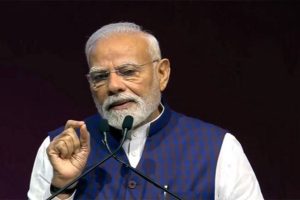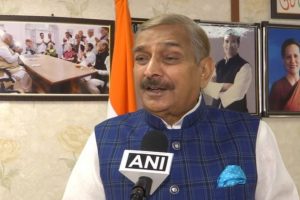Prime Minister Narendra Modi on Thursday flagged off the Bikaner-Mumbai Express and inaugurated the redeveloped Deshnoke Railway Station in Rajasthan under the Amrit Bharat Station Scheme, marking a significant stride in Indian Railways’ modernisation drive.
During his visit to Deshnoke, PM Modi also offered prayers at the Karni Mata Temple and interacted with local school children, underlining his government’s focus on both infrastructure and community engagement.
In a landmark event held virtually, the Prime Minister inaugurated 103 redeveloped railway stations spanning 86 districts across 18 states and Union Territories, as part of the Amrit Bharat Station Scheme. These stations have been designed to integrate modern passenger amenities, accessible infrastructure for Divyangjan, and sustainable, eco-friendly practices, while preserving India’s cultural heritage.
PM Modi will also lay the foundation stone for multiple railway projects worth over ₹26,000 crore, further strengthening the country’s transportation infrastructure.
- Stations in Maharashtra such as Matunga, Parel, Dhule, Savda, Wadala Road, and several others were inaugurated.
- Uttar Pradesh saw redevelopment at stations including Saharanpur Junction, Bareilly City, Bijnor, and Agra’s Idgah Junction.
- Tamil Nadu stations like Chidambaram, St Thomas Mount, Tiruvannamalai, and Srirangam were part of the scheme.
- Gujarat, Madhya Pradesh, and other states also saw significant upgrades at multiple railway stations.
The Amrit Bharat Scheme is aimed at transforming Indian railway stations into world-class transit hubs by introducing modern facilities, improved connectivity, and environmentally sustainable operations.
As part of Indian Railways’ goal to achieve 100% network electrification, PM Modi dedicated several newly electrified routes to the nation, including:
- Suratgarh-Phalodi (336 km)
- Phulera-Degana (109 km)
- Udaipur-Himmatnagar (210 km)
- Phalodi-Jaisalmer (157 km)
- Samdari-Barmer (129 km)
He also laid the foundation stone for the Churu-Sadulpur rail line (58 km), reinforcing the government’s commitment to eco-friendly and efficient railway operations.
These initiatives not only aim to enhance passenger convenience and safety but also align with India’s vision of a sustainable, digitally empowered and connected transportation network.





